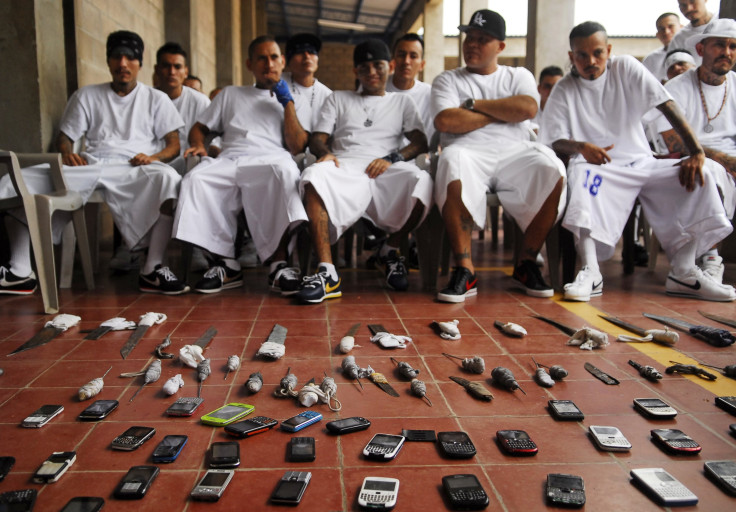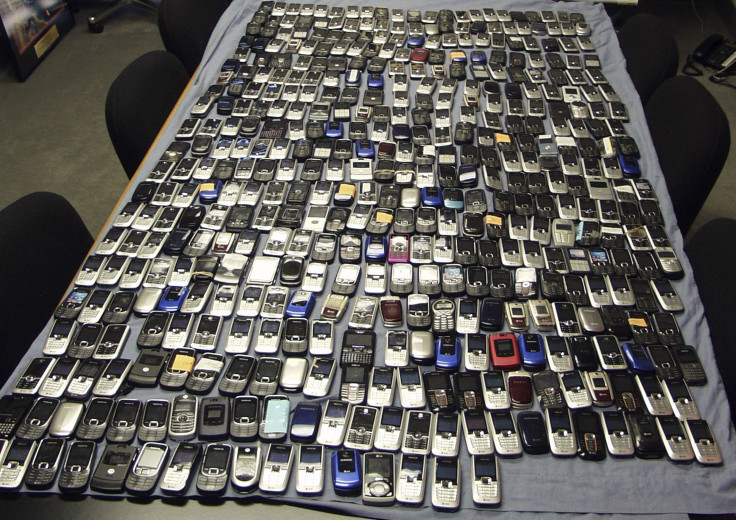For Safety, Or Profits? Inside The Debate Over Contraband Jail Cell Phones

Six years ago, Robert Johnson, a captain with the South Carolina Department of Corrections, was getting ready for work when an armed gunman kicked down his door, shot him six times in the stomach and chest, and left him for dead. The gunman, the FBI later revealed, was a hit man hired by an inmate at the prison where Johnson worked who contracted with the would-be-killer using a cell phone smuggled inside prison walls. After multiple surgeries and years of recovery, Johnson survived.
“The chaplain told my adult children I was going to die,” Johnson said at a South Carolina state hearing Wednesday. “This one cell phone brought terror to my house.”
Johnson, along with several other prison officials and politicians, are urging the federal government to step in and create stricter rules and guidelines — including building cell phone jamming technology and extra metal detectors at state and county prisons — to make sure inmates never have access to another cell phone again. Right now, the use of cell phone jammers is illegal, with the exception of sanctioned use at federal facilities. That's why these prison officials have taken their arguments to the Federal Communications Commission, which could, theoretically, allow prisons to employ jammers at their facilities.
Opponents to the jamming technology say it would render all cell phones in the area inoperable, not just inmate cell phones.
For most Americans, not having access to a cell phone would seem almost inconceivable. About 89 percent of Americans own a cell phone. But for those incarcerated, cell phones are strictly forbidden. In California, for instance, an inmate caught with a cell phone will lose up to 90 days of good-time credit, while the person who helped smuggl in the phone could face a $5,000 fine and six-month jail sentence. The fear, of course, is that inmates will use the phones for nefarious purposes, as in the case of Robert Johnson.
On Wednesday, several officials, including Johnson and South Carolina Gov. Nikki Haley, held a public meeting in Columbia, South Carolina, with FCC Commissioner Ajit Pai, to explain how cell phones smuggled inside jails can create a public safety concern. Pai explained how inmates have used the phones to order hits, run phone scams and harass victims and the families of guards from within prison walls. “With contraband cell phones, prisons and jails have become another platform for criminal enterprise,” Pai said.
Haley echoed Pai’s thoughts. “With a cellphone they can get drugs,” the governor said. “With a cell phone they can target an officer’s family. With a cell phone they can get their gangs together.”
In recent years, prison officials have confiscated a staggering number of cell phones from inmates. Over the last four years, for instance, the California Department of Corrections and Rehabilitation confiscated 30,000 cell phones. In 2015, Haley says, 4,100 contraband cell phones were confiscated from South Carolina inmates.
According to officials, the cell phones are smuggled in by a variety of methods: visitors, packages tossed over prison walls and guards. As the Los Angeles Times recently noted, some guards can fetch hundreds of dollars for smuggling in a single phone for an inmate. Despite the bans and frequent searches, corrections officials say cell phones are still pervasive.
However, exactly what the inmates are using the cell phones for is up for debate. According to law enforcement officials, inmates use these phones for illicit activity, including drug operations, intimidating witnesses and, in at least one case, ordering a contract murder outside prison walls. But families of inmates and inmate advocates have another explanation for the pervasive use of cell phones.
They say that many inmates use the phones simply because prison pay phones are too expensive. Paul Wright, an inmate advocate and the executive director of the Human Rights Defense Center, says the discussion over contraband cell phones, “is to divert attention from the financial exploitation and gouging of prisoners and families.”
As the International Business Times reported last week, many families of inmates can’t afford the high rates and fees charged by prison telecommunication companies. IBT noted the case of Omarah Zemorah, a 42-year-old resident of Ocala, Florida, who makes $8 an hour as a cashier and can’t afford to call her incarcerated daughter because it costs over $3 per 15-minute call, plus a $9.95 fee to load money into an account. “I can’t afford to talk to her,” Zemorah told IBT. “My daughter sells her trays [of food] inside the county to be able to call me... It’s mainly hard on her children. They can’t speak to their mother. Because I can’t afford it. I can only do like $20 per month. That’s all I can afford. That’s only three phone calls.”

Mitch Lucas, assistant sheriff of the Charleston County Sheriff’s Office, disagreed with the idea that inmates wanted cell phones because prices were too high. "All this is about is criminal enterprise," he said at Wednesday's meeting. "There’s no other reason."
Regardless, part of the reason prices are so high is that the jail and prison officials contract with private companies, who give local and state jurisdictions a large percentage of the phone revenue, in some cases up to 90 percent. Right now, the FCC is in the process of implementing wide-scale regulations on the industry.
For counties, jail phone revenue can be a lucrative source of funding that’s spent with little oversight or regulation. Wright, the inmate advocate, says one of the reasons prison officials and private companies are so are eager to eliminate contraband cell phones is to protect their financial interests and revenue that comes from the prison pay phones. “I think that totally drives it,” he says.
In fact, in a 2012 report by the Council on Science and Technology, state officials noted that contraband cell phones in prison can result in a variety of problems, ranging from criminal activities to illicit smuggling rings. It also noted, interestingly, that contraband phones led to a “financial loss” for the local authorities.
Inmate advocates like Wright don’t believe that it’s necessarily appropriate for convicted inmates to get access to cell phones, but he argues that there are other solutions to reduce the flow of contraband cell phones beyond expensive cell jamming technology and lengthier prison sentences.
Perhaps the best way to combat the use of contraband cell phones, he says, is to simply reduce the calling rates of phones inside prisons walls. In 2012, for instance, the New York Department of Corrections mandated that its state prisons lower its inmate calling rates. The result? Fewer contraband cell phones.
"The Department believes that a lower calling rate has also contributed to a lower rate of illicit cell phone use by inmates in New York,” wrote Anthony Annucci, the acting commissioner of the New York State Department of Corrections and Community Supervision in 2013. “In 2012, the Department confiscated less than 100 cell phones, compared to over ten thousand annual seizures in comparably-sized correctional systems.”
Prior to the Wednesday meeting, the Human Rights Defense Center submitted several questions to the corrections officials and the FCC's Pai. One of the questions asked: “To what extent is the effort to eliminate cell phone use by prisoners a ploy to increase revenues through the government monopoly [inmate] phone system and its attendant commission kickbacks to government agencies?”
The officials on hand did not address the question.
© Copyright IBTimes 2024. All rights reserved.












